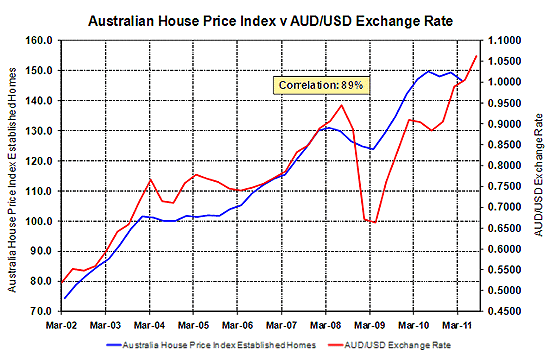
 By Roger J Kerr
By Roger J Kerr
The NZD/USD exchange rate has returned to near its 0.8300 highs following the relief-rally in global financial and investment markets after the Greek Government voted in their economic austerity package.
Prior to the Greek climax last week, the Kiwi had weakened back to between 0.8000 and 0.8100 due to lower commodity prices and a lower AUD rates against the USD. In voting in the spending cuts, tax increases and state asset sales, the Greeks averted defaulting on their debt and the financial markets hurriedly bought back what they had sold/hedged beforehand.
Certainly a failure by the Greeks to pass the austerity measures would have seen a massive sell-off in the Euro exchange rate against the USD and with that a lower NZD value.
For the meantime risk-is-back-on in the international investment markets and the NZD tends to appreciate when global sharemarkets move upwards.
Commodity prices, as measured by the CRB Index, however have not returned to their upwards path following the Greek vote. Weaker US and Chinese economic data, coupled with the formal ending of US quantitative monetary easing (QE2) has lowered global GDP growth forecasts over recent weeks and the gung-ho confidence of buying commodity prices higher has dissipated.
The feeling in international commodity markets is that the favourable winds pushing prices higher over the March 2010 to March 2011 period have turned somewhat, particularly as higher food and energy prices hurt consumer spending around the world and threatened the global economic recovery.
The investors and speculators in commodities are now re-assessing their 'long' strategies and market positioning.
The Australian dollar was trading below $1.0500 against the USD prior to the Greek vote. It has bounced back up again to $1.0780, however further weakness in the CRB Commodity Index should prevent any further AUD gains.
Looking ahead over coming weeks, the following economic and market developments stand out as being potentially positive or negative for the NZD/USD exchange rate from current elevated levels:
Positives
- New Zealand GDP figures on Thursday 7 July for the March quarter may well prove to be more positive than what the markets expect. Improvements in retail, export and manufacturing sectors may produce a quarterly increase of up to +0.5%, whereas no so long ago market economists were forecasting a negative number.
- The NZIER quarterly survey of business opinion on Tuesday 5th July should confirm the stronger business outlook seen in the monthly surveys. High export prices are certainly lifting production and investment in the New Zealand economy. True to form, the NZIER economists will endeavour to put a gloomy spin on likely positive survey results.
- The European Central Bank review their official interest rates on Thursday 7 July and another increase will be positive for the Euro currency and thus send the Kiwi up through the previous 0.8320 highs. A no increase decision by the ECB with tough talk on controlling inflation would be neutral for the EUR and NZD, as it is no change to the current position.
- The NZD is no longer matching the gains on Wall Street like it was a few months ago, however the stronger US manufacturing ISM Index released last Friday (up from +53 to +55) does suggest that the weak patch in US economic data could be coming to an end. The Federal Reserve’s view that the weaker data over recent months was only temporary could be further confirmed by stronger employment figures this Friday 8th July. The stronger US economic picture would be positive for the Dow Jones Index.
Negatives
- The Reserve Bank of Australia is not expected to change their official interest rates when they meet on Tuesday 5th July. A more dovish than expected statement could be on the cards as the RBA recognises that weaker domestic economic data (outside the mining states) has arguably lowered future inflation risks. International economic commentators still fret that Australia’s house price bubble has never deflated during or after the GFC. There is no question that higher mortgage interest rates is hurting demand and spending in the mortgage belts in Sydney and Melbourne. The Aussie money markets are pricing for no change in interest rates. Further reductions in residential property prices in Australia will not be positive for the AUD (see correlation in chart below).
- Outside the normal international influences, the one variable that could cause the Kiwi dollar to drop on its own is Wholemilk Powder (WMP) prices. Fonterra are not expecting a major correction down in WMP prices from the current lofty levels that they have risen to. However, buyer resistance and substitution of WMP is causing some nervousness about the sustainability of the super high prices. The Global Dairy Trade auctions this week may see lower prices as the latest market uneasiness permeates through.
- Global FX markets may now start to focus on the US ending the printing of additional US dollars with the cessation of QE2, now the Greek crisis is avoided - for the meantime at least. Looking ahead, US short-term interest rates eventually returning to normal levels around 3% should be positive for the USD across the board. A break below $1.4000 in the EUR/USD rate on more positive USD sentiment is the one factor that can return the NZD/USD rate to the mid 0.7000’s over coming months.
How these positive and negative forces play out will determine whether the NZD can hold onto the recent gains to the record high of 0.8300.

--------------------
* Roger J Kerr runs Asia Pacific Risk Management. He specialises in fixed interest securities and is a commentator on economics and markets. More commentary and useful information on fixed interest investing can be found at rogeradvice.com
No chart with that title exists.

We welcome your comments below. If you are not already registered, please register to comment
Remember we welcome robust, respectful and insightful debate. We don't welcome abusive or defamatory comments and will de-register those repeatedly making such comments. Our current comment policy is here.